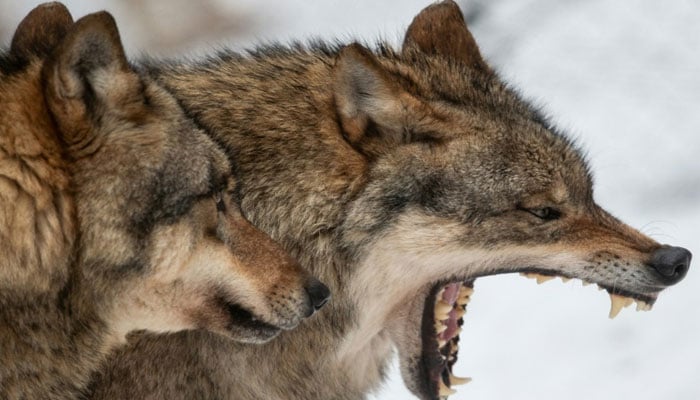In Germany, the fear of the wolf turns to the political debate
One morning in November, a 55-year-old gardener works in a cemetery kneeling near a fence when the animal, surreptitiously approaching from behind, bites his left arm. Despite the shock, the city employee manages to hit him with a hammer and make him run away.
"A wolf attacks a man": true or false, this story reported in the Daily newspaper Bild, the most read of Germany, has fueled the debate on the increased presence of this predator in the country, noted in the German campaigns and generating diffuse fears.
One morning in November, a 55-year-old gardener works in a cemetery kneeling near a fence when the animal, surreptitiously approaching from behind, bites his left arm. Despite the shock, the city employee manages to hit him with a hammer and make him run away.
At least that is how the victim, who remained anonymous, told his misfortune to the Steinfeld authorities in Lower Saxony (north). Witnesses of the scene? Three other wolves, says the gardener.
However, laboratory tests on the wound, clothing or hammer revealed no trace of saliva or fur from a wolf. The track now seems to be moving towards wild dogs.
But the debate, very political, is launched in the country.
"What this story has mostly managed to do is spread uncertainty and fear," laments the guide Stephan Kaasche, connoisseur and defender of the canis lupus.
Propagate fear
After 150 years of absence, the common gray wolf, eternal villain in the tales of the Brothers Grimm, made in 2000 a great return in the German countryside - greeted by nature lovers - after crossing the border from Poland.
The Ministry of the Environment currently has 800 in the country, or 73 packs in 2018 (with at least 9 specimens each), 13 packs more than a year ago. And the number of couples has also increased.
No human aggression has been reported.
But if in the past the wolf has already taken the sheep, it is the frequency of recent incidents and their magnitude that begin to worry or even revolt breeders and riders. And to be passionate in the ranks of the far right, who has caught this controversial subject in the approach of three regional polls.
In October, a herd is attacked during the night. Its owner discovers the next day about forty bloody carcasses. Most prey were slaughtered without being eaten.
On the internet and social networks, campaigns and petitions are multiplying against the animal. His "ferocity is very underestimated" by ecologists, says the portal "Wolf, no thank you". A snub to the most famous slogan of the German Greens "Atomic Energy? No thanks".
Rifles in hand, breeders organize night guards to defend their animals, at their own risk because he who illegally slaughters a wolf - an animal protected by both the Berne Convention and a European Union directive - incurs up to five years in prison.
The extreme right, always on the lookout for leading themes neglected by the established parties, has recognized the potential of the undesirable, which swarms in the regions of the former GDR, political bastions of the Alternative Party for Germany ( AFD).
"And what do we do next time they attack children?", Wonders in the weekly Die Zeit party spokesman in Saxony-Anhalt (east), Silke Grimm, namesake of the famous brothers storytellers.
The conservative CDU, which left Angela Merkel, who will face the AfD in three regional elections in September and October in the East, has therefore given her approval to soften their slaughter in some cases.
"Politicized animal"
But that will not solve the problem, sighs Stephan Kaasche, according to which "10% of the wolves are already slaughtered illegally now". "It does not stop them from approaching cities, just like wild boars - it does not work that way."
In total around 280 wolves have been killed in Germany since 2000, according to police statistics quoted by the media, usually in car accidents.
Passionate about wildlife, Stephan Kaasche is held one autumn morning, binoculars in front of the eyes, near a former coal mine converted into a nature reserve, in Hoyerswerda, in Lusatia, an area on the Polish border. And observe.
"Over there, a wolf!", He writes, pointing to a greyish silhouette, with an unbroken enthusiasm even though he has already seen wolves a hundred or so times in his life.
The fear of this animal goes back to the distant time when rabies was still raging and where his bite was actually fatal, he recalls, adding that man does not count among his natural prey.
For Die Zeit, the wolf has become "the most politicized animal in Germany". The debate is more and more like an opposition between urban green people, with very romantic ideas of nature, and rural populations wanting to protect their property and their families, he says.
For the weekly, "sacrificing sheep in the name of a fascination for the wolf is a cynical behavior".
-
EU rejects any rise in US tariffs after court ruling, says ‘a deal is a deal’
-
Woman allegedly used ChatGPT to plan murders of two men, police say
-
UK seeks ‘best possible deal’ with US as tariff threat looms
-
Sterling K. Brown's wife Ryan Michelle Bathe reveals initial hesitation before taking on new role
-
Rising energy costs put UK manufacturing competitiveness at risk, industry groups warn
-
Liza Minnelli recalls rare backstage memory with mum Judy Garland in new memoir
-
Armed intruder shot dead at Trump's Mar-a-Lago residence: US Secret Service
-
Kurt Russell spills the beans on his plans for milestone birthday this year: 'Looking forward to it'












